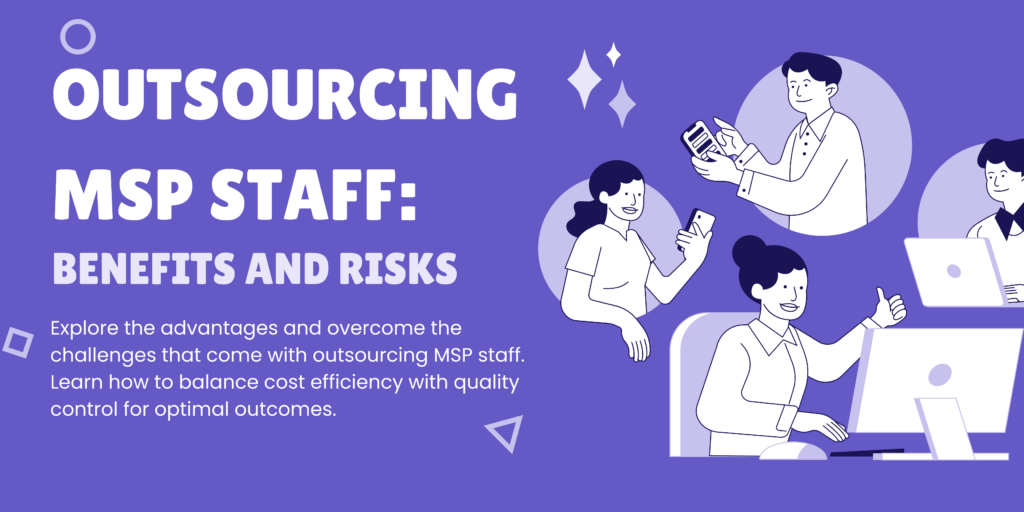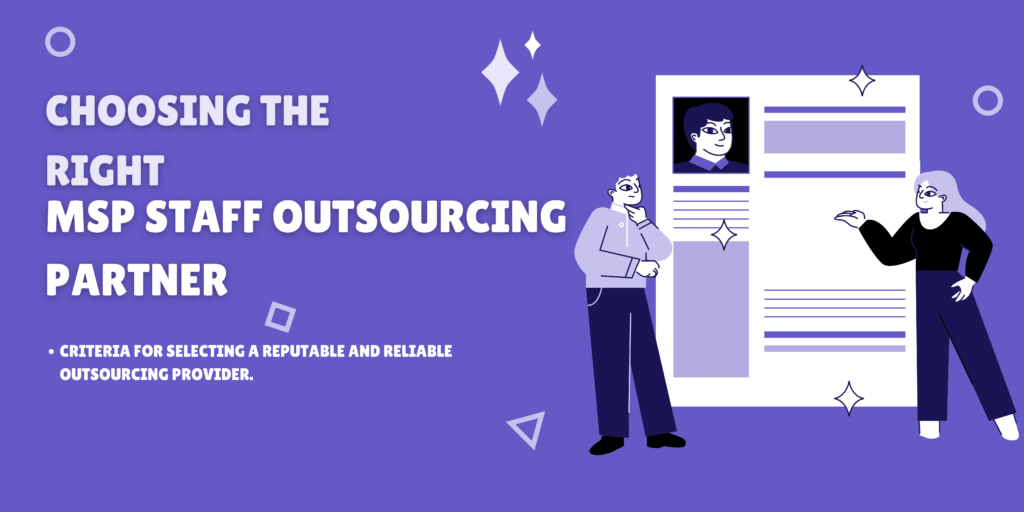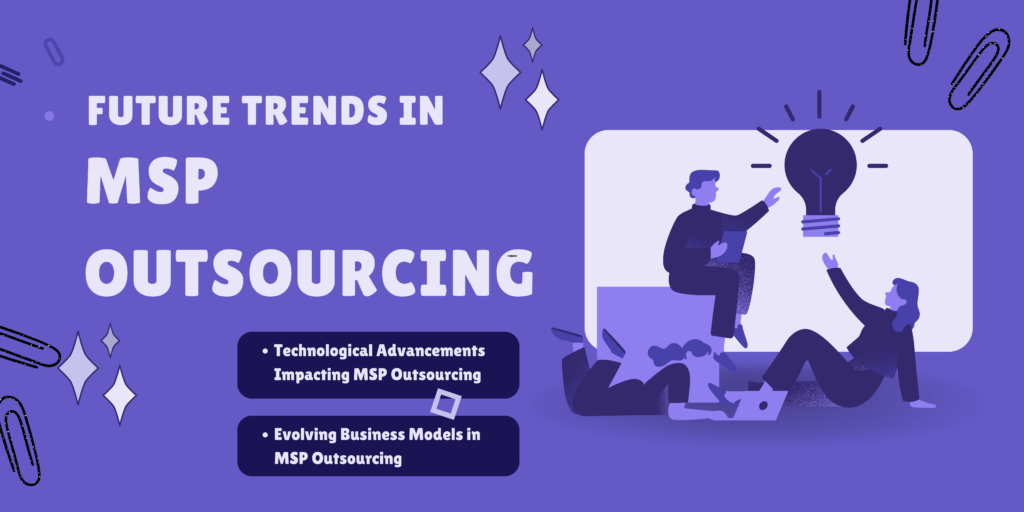Outsourcing MSP staff presents both opportunities and challenges for MSPs. While it offers cost savings, access to specialized skills, and enhanced flexibility, it also poses risks like quality control and communication barriers. This article examines the strategic benefits and solutions to potential pitfalls of outsourcing, providing MSPs with a balanced view. Learn how to effectively manage outsourced teams, ensuring they align with your business’s quality standards and operational goals while maintaining security and compliance.
For example, consider the service desk: if you outsource it, you might lose some control over customer experiences, which could harm client relationships. On the other hand, keeping it in-house could result in long ticket resolution times and overworked employees, according to an article from MSP360.
What is MSP Staff Outsourcing?
- Definition of outsourcing in the context of MSP operations.
- Overview of why MSPs might choose to outsource staff, including the potential benefits and risks.

MSP Outsourcing (MSP staff outsourcing) refers to the practice where Managed Service Providers (MSPs) contract external personnel or firms to perform various IT and support functions that would traditionally be handled by in-house employees. This approach allows MSPs to augmentand their workforce with specialized talent without the overhead costs associated with finding, hiring, training, and retaining full-time staff. For example, outsourcing MSP staff can make an MSP more attractive to clients by providing 24/7 (round-the-clock, or after-hours support) done by techs in their daytime shifts. These techs, working their usual hours, are for example, more rested and focused on the quality of service. This way, MSPs’ scalability, flexibility, and service quality can increase!
MSPs can choose to outsource the Recruitment Process (RPO), do Selection Process Outsourcing (SPO), or outsource a business process in recruitment (BPO), for their respective benefits.
Why Would an MSP Outsource Staff?
Outsourcing MSP staff has become increasingly popular and the demand for agencies that provide high-quality MSP recruitment services is on the rise. A good MSP staffing agency will tell you that the first and most obvious reason for outsourcing is cost saving. This is the most obvious benefit. However, there is so much more to it.
Benefits of Outsourcing MSP Staff
MSPs can benefit from outsourcing staff in many ways:
- Cost Efficiency:
- Mitigation of Overhead Costs: Traditional hiring includes various overhead costs such as recruitment, onboarding, and employee benefits. Outsourcing staff mitigates these expenses, offering a more cost-effective alternative
- Pay-as-you-go Model: Many outsourcing arrangements allow MSPs to pay for services only when they are needed, providing financial flexibility and aligning expenditures with project timelines
- Access to Specialized Expertise:
- Skilled Personnel: Outsourcing enables MSPs to access a global pool of skilled IT professionals who are experienced in various domains, such as cybersecurity, network management, help desk, and cloud services.
- Immediate Expertise: This model provides rapid access to pre-vetted professionals with the necessary skills to meet client demands promptly.
- Scalability and Flexibility:
- Rapid Scaling: Outsourcing allows MSPs to quickly scale their operations up or down based on client demands, avoiding the delays associated with recruiting and training new employees
- Project-based Engagement: MSPs can engage external staff for specific projects or timeframes, ensuring that resources are optimally utilized according to project needs.
- Improved Service Quality:
- Enhanced Performance: External experts often bring higher service quality and efficiency due to their specialized focus and experience.
- Accountability: Outsourcing agreements typically include service level agreements (SLAs) that hold external staff accountable for their performance, ensuring reliability and consistency.
- Risk Management:
- Risk Sharing: Outsourcing helps distribute risks associated with service delivery and compliance between the MSP and the service provider. This includes data security and regulatory compliance.
- Business Continuity: External providers often have robust disaster recovery and business continuity plans, ensuring minimal service disruption.
Examples of Outsourced MSP Staff Roles
There are many beneficial roles outsourced MSP staff can perform:
- Help Desk Support: Providing first-level support for client issues, resolving common technical problems, and escalating complex issues to higher-level support.
- Level 2 IT Technicians: Handling more complex technical issues that require deeper expertise than level 1 support can provide.
- Level 3 IT Technicians: Addressing the most complex and advanced technical problems, often involving deep system troubleshooting and advanced configurations.
- Dispatchers: Coordinating and assigning tasks to the appropriate technical staff, ensuring efficient response to client needs.
- System Administrators: Managing and maintaining servers, ensuring system stability, security, and performance.
- Network Engineers: Managing and maintaining client networks, ensuring optimal performance and security.
- Cybersecurity Experts: Monitoring and defending against security threats, conducting vulnerability assessments, and implementing security protocols.
- Cloud Specialists: Managing cloud infrastructure, migrating services to the cloud, and optimizing cloud performance.
- Project Managers: Overseeing specific IT projects, ensuring they are completed on time, within scope, and on budget.
Risks of Outsourcing MSP Staff
Quality Control Challenges
- Potential compromises in service quality due to lack of direct control.
- Difficulties in maintaining consistent service standards.
Security and Compliance Issues
- Risks associated with data security and privacy when outsourcing.
- Compliance with regulations and standards across different regions.
Communication and Cultural Barriers
- Potential issues due to time zone differences and language barriers.
- Cultural misalignments that might affect service delivery and client satisfaction.
Quality Control Challenges
Challenges:
- Potential Compromises in Service Quality: When outsourcing, there may be a risk of inconsistent service quality due to the lack of direct oversight and control over the external staff.
- Difficulties in Maintaining Consistent Service Standards: Variability in the skill levels and practices of outsourced staff can lead to challenges in maintaining the high standards expected by clients.
Solutions:
- Rigorous Vetting Processes: Implementing thorough vetting processes, including technical assessments and reference checks, ensures that the outsourced staff meet the required quality standards.
- Regular Performance Monitoring: Establishing regular performance evaluations and feedback mechanisms helps maintain service quality and address any issues promptly.
Security and Compliance Issues
Challenges:
- Data Security Risks: Outsourcing can introduce risks associated with data security and privacy, as sensitive information is handled by third-party providers.
- Compliance with Regulations: Ensuring compliance with various regional regulations and standards can be complex when outsourcing across different geographic areas.
Solutions:
- Robust Data Security Protocols: Implementing strong data security measures, including secure communication channels, access controls, and regular security audits, helps protect sensitive information.
- Clear Compliance Guidelines: Defining and communicating clear compliance requirements and ensuring that outsourced staff adhere to these standards is crucial for regulatory adherence.
Communication and Cultural Barriers
Challenges:
- Time Zone Differences: Coordination issues can arise due to time zone differences, affecting the responsiveness and efficiency of outsourced staff.
- Language Barriers: Misunderstandings and miscommunications can occur due to language differences, impacting service delivery and client interactions.
- Cultural Misalignments: Differences in work culture and practices can lead to challenges in aligning outsourced staff with the company’s expectations and standards.
Solutions:
- Regular Communication Protocols: Establishing clear communication channels, regular virtual meetings, and using collaboration tools can help bridge communication gaps caused by time zones and language differences.
- Cultural Training and Onboarding: Providing cultural training and a comprehensive onboarding process that includes the company’s values and expectations helps align external staff with the MSP’s culture and service standards.
- Team-building Activities: Engaging in team-building activities and fostering an inclusive work environment can enhance collaboration and integration between internal and outsourced teams.
By understanding and addressing these challenges, MSPs can effectively leverage outsourcing to enhance their service offerings, manage costs, and maintain a competitive edge in the market.
Strategies for Mitigating Risks

Choosing the Right Outsourcing Partner
- Criteria for selecting a reputable and reliable outsourcing provider.
- Importance of due diligence and reference checks.
Establishing Clear Contracts and SLAs
- The role of well-defined contracts and Service Level Agreements (SLAs) in ensuring quality and compliance.
- Key components of effective contracts and SLAs.
Implementing Robust Communication Systems
- Tools and practices for ensuring effective communication across different locations.
- Regular meetings and updates to keep all parties aligned.
Choosing the Right Outsourcing Partner
- Criteria for Selecting a Reputable and Reliable Outsourcing Provider:
- Industry Expertise: Ensure the provider has a deep understanding of the MSP industry, including relevant experience and technical expertise.
- Proven Track Record: Look for a provider with a history of successful partnerships, supported by client testimonials and case studies.
- Cultural Compatibility: Ensure the outsourcing provider aligns with your company’s values, communication style, and work culture to enhance collaboration and integration.
- Importance of Due Diligence and Reference Checks:
- Thorough Evaluation: Conduct detailed reference checks and technical assessments to verify the provider’s capabilities and reliability.
- Regulatory Compliance: Ensure the provider complies with relevant industry standards and regulations.
- Trial Period: A good outsourcing partner will provide you with a trial period, as we at Support Adventure do, to ensure you are happy with your outsourced staff before making a commitment.
Here are 21 questions to ask the MSP Staff Outsourcing Company you are considering working with.
Establishing Clear Contracts and SLAs
- The Role of Well-defined Contracts and Service Level Agreements (SLAs) in Ensuring Quality and Compliance:
- Clear Expectations: Contracts and SLAs should clearly define the roles, responsibilities, and performance metrics to ensure accountability and quality service delivery.
- Compliance Requirements: Include specific compliance and security protocols to ensure adherence to industry standards and regulations.
- Key Components of Effective Contracts and SLAs:
- Service Scope: Clearly outline the services to be provided, including detailed descriptions and expected outcomes.
- Performance Metrics: Define measurable performance indicators and response times to monitor and evaluate service quality.
- Termination Clauses: Include terms for contract termination and procedures for transitioning services smoothly.
Implementing Robust Communication Systems
- Tools and Practices for Ensuring Effective Communication Across Different Locations:
- Collaboration Tools: Utilize tools like Slack, Microsoft Teams, and Zoom for seamless communication and collaboration.
- Project Management Platforms: Implement platforms like Trello or Asana to keep track of tasks, deadlines, and project progress.
- Regular Meetings and Updates to Keep All Parties Aligned:
- Scheduled Check-ins: Conduct regular meetings and updates to ensure alignment and address any issues promptly.
- Feedback Mechanisms: Establish channels for continuous feedback and communication to maintain transparency and collaboration.
Future Trends in Outsourcing for MSPs

Technological Advancements Impacting Outsourcing
- How emerging technologies like AI and automation might change outsourcing needs.
- The future role of remote work technologies in facilitating outsourcing.
Evolving Business Models in MSP Outsourcing
- Predictions on how outsourcing strategies may evolve with changing market conditions.
- Anticipating shifts in global labor markets and their impacts on outsourcing.
Technological Advancements Impacting MSP Outsourcing
- AI and Automation: Emerging technologies like AI and automation are expected to streamline outsourcing processes, improving efficiency and reducing costs.
- Remote Work Technologies: The continued evolution of remote work technologies will further facilitate outsourcing by enhancing communication and collaboration.
Evolving Business Models in MSP Outsourcing
- Strategic Adaptations: Outsourcing strategies will evolve to meet changing market conditions, focusing on flexibility and scalability.
- Global Labor Market Shifts: Anticipated shifts in global labor markets
Final Words on Outsourcing MSP Staff
Outsourcing MSP staff offers MSPs significant benefits, such as cost savings, access to specialized skills, enhanced flexibility, and after-hours support. However, it also comes with challenges like quality control and communication barriers. To effectively manage these risks, MSPs should focus on choosing the right outsourcing partner, establishing clear contracts and SLAs, and implementing robust communication systems. Additionally, future trends like AI and remote work technologies will further shape outsourcing practices, enhancing efficiency and scalability while requiring ongoing adaptation to global labor market shifts.



0 Comments